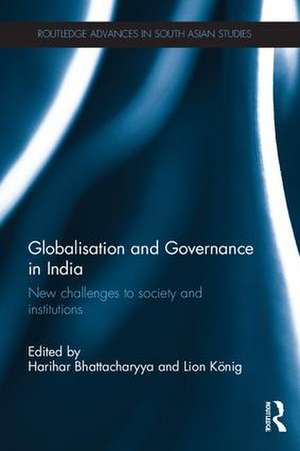Globalisation and Governance in India: New Challenges to Society and Institutions: Routledge Advances in South Asian Studies
Editat de Harihar Bhattacharyya, Lion Königen Limba Engleză Hardback – 4 aug 2015
Through a range of disciplinary perspectives, the authors analyse how India’s version of secularism, communal harmony, nationhood, the public sphere, social justice, and the rights of aboriginal communities came under attack from the forces of the new dispensation. The book goes on to show how globalisation in India has posed fresh challenges to political economy, democracy, federalism, decentralization, parliamentary system, judiciary, and the parliamentary Left.
Critically reflecting on themes in the context of India’s globalisation that are local, regional, national and global, this book will be of interest to those in the fields of South Asian Politics, Globalisation, and International Relations.
| Toate formatele și edițiile | Preț | Express |
|---|---|---|
| Paperback (1) | 409.48 lei 6-8 săpt. | |
| Taylor & Francis – 28 iun 2018 | 409.48 lei 6-8 săpt. | |
| Hardback (1) | 1053.95 lei 6-8 săpt. | |
| Taylor & Francis – 4 aug 2015 | 1053.95 lei 6-8 săpt. |
Din seria Routledge Advances in South Asian Studies
-
 Preț: 349.17 lei
Preț: 349.17 lei -
 Preț: 321.41 lei
Preț: 321.41 lei -
 Preț: 317.67 lei
Preț: 317.67 lei - 16%
 Preț: 298.10 lei
Preț: 298.10 lei - 26%
 Preț: 567.75 lei
Preț: 567.75 lei - 20%
 Preț: 184.81 lei
Preț: 184.81 lei - 16%
 Preț: 323.44 lei
Preț: 323.44 lei -
 Preț: 420.08 lei
Preț: 420.08 lei -
 Preț: 415.67 lei
Preț: 415.67 lei - 11%
 Preț: 304.68 lei
Preț: 304.68 lei -
 Preț: 276.84 lei
Preț: 276.84 lei - 14%
 Preț: 301.13 lei
Preț: 301.13 lei - 15%
 Preț: 721.51 lei
Preț: 721.51 lei - 25%
 Preț: 766.66 lei
Preț: 766.66 lei -
 Preț: 485.46 lei
Preț: 485.46 lei - 18%
 Preț: 1001.84 lei
Preț: 1001.84 lei - 18%
 Preț: 1052.35 lei
Preț: 1052.35 lei -
 Preț: 416.96 lei
Preț: 416.96 lei - 16%
 Preț: 298.41 lei
Preț: 298.41 lei - 18%
 Preț: 1001.07 lei
Preț: 1001.07 lei - 18%
 Preț: 1110.81 lei
Preț: 1110.81 lei - 18%
 Preț: 1058.79 lei
Preț: 1058.79 lei -
 Preț: 486.71 lei
Preț: 486.71 lei - 15%
 Preț: 675.24 lei
Preț: 675.24 lei -
 Preț: 278.75 lei
Preț: 278.75 lei - 18%
 Preț: 1054.97 lei
Preț: 1054.97 lei -
 Preț: 418.22 lei
Preț: 418.22 lei -
 Preț: 416.22 lei
Preț: 416.22 lei -
 Preț: 279.94 lei
Preț: 279.94 lei - 30%
 Preț: 846.53 lei
Preț: 846.53 lei -
 Preț: 371.68 lei
Preț: 371.68 lei - 16%
 Preț: 297.62 lei
Preț: 297.62 lei - 15%
 Preț: 699.73 lei
Preț: 699.73 lei
Preț: 1053.95 lei
Preț vechi: 1285.31 lei
-18% Nou
Puncte Express: 1581
Preț estimativ în valută:
201.74€ • 219.21$ • 169.57£
201.74€ • 219.21$ • 169.57£
Carte tipărită la comandă
Livrare economică 21 aprilie-05 mai
Preluare comenzi: 021 569.72.76
Specificații
ISBN-13: 9781138853232
ISBN-10: 1138853232
Pagini: 196
Ilustrații: 2 black & white illustrations, 5 black & white tables, 1 black & white halftones, 1 black & white line drawings
Dimensiuni: 156 x 234 x 15 mm
Greutate: 0.43 kg
Ediția:1
Editura: Taylor & Francis
Colecția Routledge
Seria Routledge Advances in South Asian Studies
Locul publicării:Oxford, United Kingdom
ISBN-10: 1138853232
Pagini: 196
Ilustrații: 2 black & white illustrations, 5 black & white tables, 1 black & white halftones, 1 black & white line drawings
Dimensiuni: 156 x 234 x 15 mm
Greutate: 0.43 kg
Ediția:1
Editura: Taylor & Francis
Colecția Routledge
Seria Routledge Advances in South Asian Studies
Locul publicării:Oxford, United Kingdom
Public țintă
PostgraduateCuprins
Foreword Introduction 1. The Globalization-Decentralization Nexus: The Indian Predicament 2. Changes in Indian Politics until the 1990s: Issues and Trends 3. Cultural Globalization in India: Towards a ‘Third Space’ 4. Challenges to Democratic Governance in India: An ‘Unfinished Symphony’ 5. The New Political Economy of Judicial Review in India 6. Globalization, Extremist Violence and the Indian Left: A Critical Appraisal 7. Policing in India: A Failed Case of Institutional Reform? 8. The Problems of Statehood in Indian Federalism: A Case for Territorial Pluralism 9. Regional Movements in India: Evaluating Telengana and Uttarakhand 10. Governing India’s Localities: Limits of Structural and Governance Reforms 11. Conclusion: India’s Second ‘Tryst with Destiny’
Notă biografică
Harihar Bhattacharyya is Professor of Political Science and Head of the Department of Political Science, The University of Burdwan, India.
Lion König is Adjunct Faculty at the Centre for Culture, Media and Governance, Jamia Millia Islamia, New Delhi. He is the co-editor of the book, The Politics of the 'Other' in India and China: Western Concepts in Non-Western Contexts, published by Routledge (2015).
Lion König is Adjunct Faculty at the Centre for Culture, Media and Governance, Jamia Millia Islamia, New Delhi. He is the co-editor of the book, The Politics of the 'Other' in India and China: Western Concepts in Non-Western Contexts, published by Routledge (2015).
Descriere
In 1991, India officially embraced the policy of neo-liberal reforms by signing the GATT agreement, which exposed the country, its society, culture and institutions to the various forces of globalisation. Globalisation as such may not be new to India, for the country has been exposed to the external cultures and civilisations for millennia, but the post-1991 reforms policy marked a significant shift, from a predominantly social welfare state and a command economy to a predominantly market driven one. This book examines some important aspects of the complex interface between India’s globalisation and Indian society, culture and public institutions.








